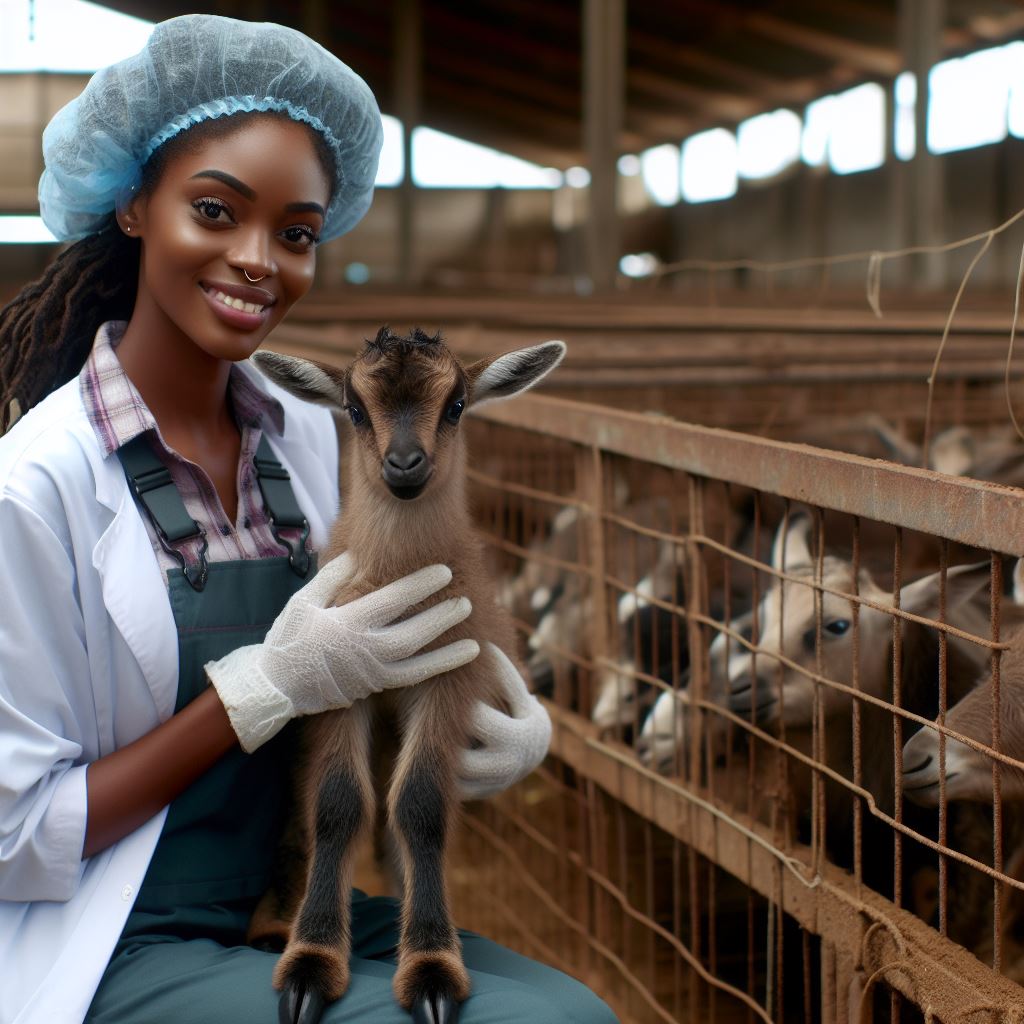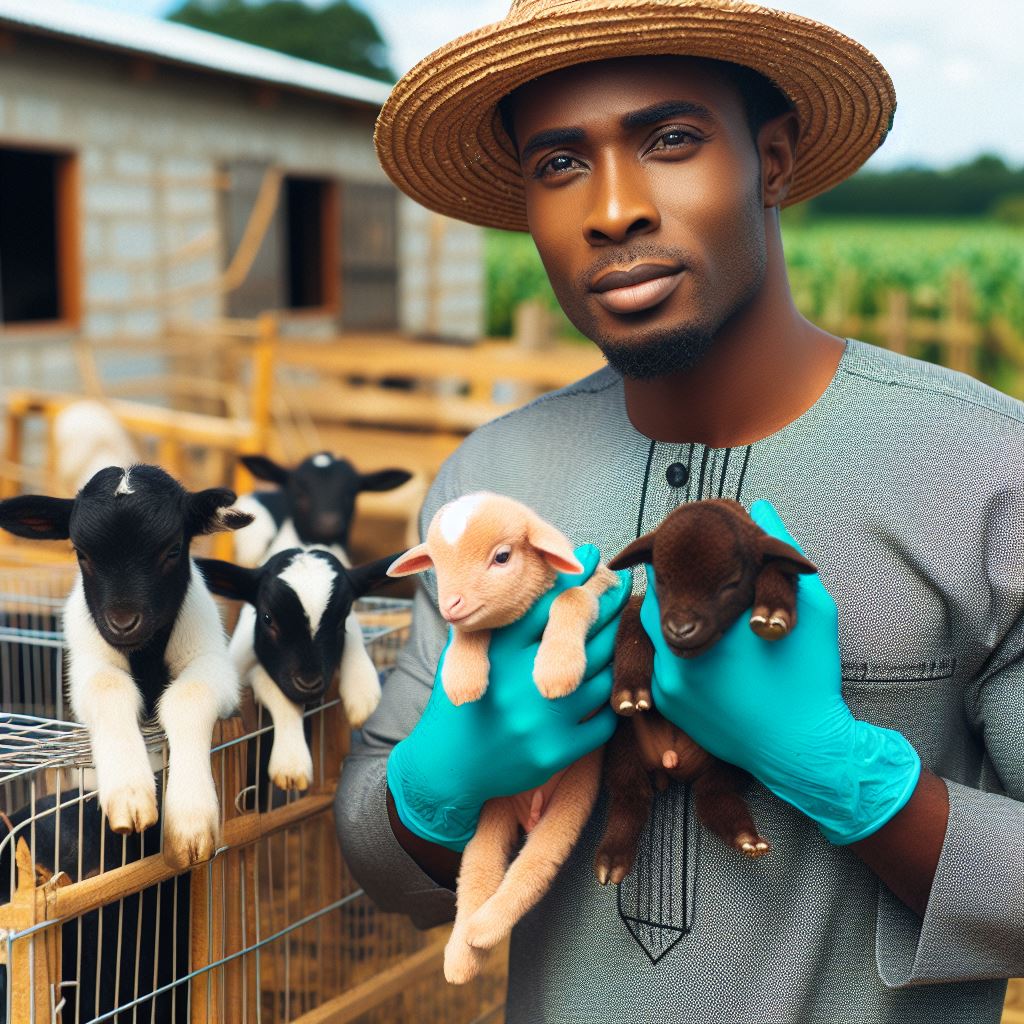Introduction
Graduating in Animal Nutrition from Nigeria opens vast opportunities. Understanding the importance of career prospects in this field is pivotal.
Nigeria’s agricultural landscape is evolving, creating a growing demand for skilled professionals in animal nutrition.
Graduates in this field possess a unique advantage.
They hold the key to addressing critical issues in livestock production, ensuring optimal health, and maximizing productivity.
The country’s economy heavily relies on agriculture, making expertise in animal nutrition indispensable.
The significance of this profession extends beyond borders.
Graduates contribute to global food security by enhancing animal health and production efficiency.
A career in animal nutrition offers diverse paths, including research, consultancy, and farm management.
Graduates may engage in innovative feed formulation, tackling nutritional challenges to meet evolving industry needs.
Nigeria’s agricultural sector welcomes professionals adept in animal nutrition.
The industry seeks individuals capable of revolutionizing livestock management through advanced nutritional strategies.
Graduates equipped with specialized knowledge become pivotal in enhancing animal welfare and sustainable production practices.
Embracing this career path unlocks opportunities to work with governmental bodies, NGOs, and private sectors.
Animal nutrition graduates actively shape policies, fostering agricultural development and food sustainability.
Excelling in this field demands a passion for continuous learning and innovation.
Graduates play a vital role in elevating Nigeria’s livestock sector, ensuring its competitiveness on the global stage.
The pursuit of a career in animal nutrition in Nigeria promises a dynamic and impactful professional journey.
As graduates, the potential to make a tangible difference in the agricultural landscape is immense.
The stage is set for graduates in animal nutrition to drive positive change, contributing significantly to Nigeria’s agricultural growth.
Overview of Animal Nutrition
Animal nutrition is a fascinating field that focuses on the dietary needs of animals and how proper nutrition can enhance their health and productivity.
Graduating from Nigeria with a degree in animal nutrition opens up a world of career prospects.
Animal nutritionists play a crucial role in ensuring that animals receive the right balance of nutrients for optimal growth, reproduction, and overall well-being.
They work in various settings, including research institutions, feed manufacturing companies, livestock farms, and government agencies.
The Significance of Animal Nutrition
Animal nutrition is of utmost importance because animals, just like humans, require a balanced diet to thrive.
Proper nutrition provides the necessary energy, nutrients, and minerals needed to support growth, maintain good health, and enhance productivity in livestock, pets, and other animals.
The Role of Animal Nutritionists
Animal nutritionists are responsible for formulating and designing diets that meet animals’ nutritional requirements.
They conduct research to understand the nutritional needs of different species.
By analyzing feed ingredients and their nutrient composition, they create diets that support specific stages of an animal’s life cycle.
Animal nutritionists also work closely with farmers and livestock owners to ensure that animals are receiving optimal nutrition.
They provide advice on feed management, including the right type and amount of feed to provide at different stages.
This collaboration is essential in improving animal health, reducing disease, and increasing productivity.
Areas of Specialization in Animal Nutrition
Graduates in animal nutrition have the opportunity to specialize in various areas, depending on their interests and career goals.
- Ruminant Nutrition: Ruminant animals, such as cattle, sheep, and goats, have unique digestive systems. Graduates can specialize in formulating diets that cater to their specialized needs.
- Poultry Nutrition: Poultry production is a rapidly growing industry. Nutritionists specializing in poultry work on optimizing feed formulations to improve growth rates, egg production, and overall bird health.
- Aquaculture Nutrition: With the increasing demand for fish and seafood, aquaculture has become essential.
Animal nutritionists in this field focus on developing balanced diets for fish and marine organisms to enhance growth, reproduction, and overall quality. - Pet Nutrition: Animal nutritionists specializing in pet nutrition work with pet food companies and veterinary clinics to formulate diets that meet the nutritional needs of dogs, cats, and other companion animals.
- Feed Manufacturing and Quality Control: Another area of specialization is working in feed manufacturing companies, ensuring that animal feeds are produced to meet specific nutritional standards and quality control measures.
In addition to these specialized areas, animal nutritionists can also pursue careers in research and academia, where they contribute to the advancement of knowledge in the field.
They can conduct studies on feed additives, evaluate the nutritive value of various feed ingredients, and develop new and improved feeding strategies.
Graduating in animal nutrition from Nigeria opens up a wide range of career prospects.
Whether it be formulating diets for ruminants, working in the poultry industry, or contributing to the field through research, animal nutritionists play a vital role in ensuring the health and productivity of animals.
Read: Postgraduate Opportunities in Animal Science in Nigeria
Animal Nutrition Programs in Nigeria
Universities or Institutions in Nigeria that offer animal nutrition programs
- University of Ibadan: Their Faculty of Agriculture offers a B.Sc. in Animal Production and Health.
- Federal University of Agriculture Abeokuta: They offer a B.Sc. in Animal Nutrition and Biotechnology.
- University of Nigeria, Nsukka: Their Faculty of Agriculture offers a B.Sc. in Animal Science.
Curriculum and Courses
- Animal Nutrition: This course covers the principles and practices of feeding animals for optimal growth and performance.
- Genetics and Breeding: Students learn about genetics, breeding techniques, and the improvement of animal populations.
- Livestock Production Systems: This course explores different production systems and their impact on animal nutrition.
- Animal Physiology: Students gain knowledge of animal physiology and its relation to nutrition and health.
- Feed Formulation and Ration Balancing: This course teaches students how to formulate balanced diets for different animal species.
- Animal Health and Disease Control: Students learn about common diseases, their prevention, and the role of nutrition in disease resistance.
Practical Training and Internship Opportunities
- University of Ibadan: Students have the opportunity to participate in farm practicals and work at the university’s livestock farm.
- Federal University of Agriculture Abeokuta: They offer internships in collaboration with agribusiness companies, providing hands-on experience.
- University of Nigeria, Nsukka: The university collaborates with livestock companies to offer students practical training in animal nutrition.
Benefits of Pursuing Animal Nutrition in Nigeria
- Growing Demand: With Nigeria’s expanding population, there is an increasing demand for animal products, fueling the need for animal nutrition specialists.
- Diverse Career Prospects: Graduates can pursue careers as animal nutritionists, researchers, consultants, or work in government agencies.
- Contribution to Food Security: By improving animal nutrition, graduates contribute to the provision of quality animal protein in Nigeria.
- Entrepreneurship Opportunities: Animal nutrition graduates can establish their own feed formulation businesses or consultancies.
- Research and Innovation: Students have the chance to conduct research in collaboration with industry partners to develop innovative solutions.
Pursuing a career in animal nutrition in Nigeria offers numerous opportunities for growth and impact.
By enrolling in reputable universities and institutions, students gain the relevant knowledge and practical experience needed to excel in this field.
As the demand for quality animal products continues to rise, animal nutrition graduates play a vital role in ensuring adequate feeding, improved production, and overall food security in Nigeria.
Transform Your Career with Expert Guidance
Get personalized mentorship consulting that’s tailored to your unique path. Our expert advice is actionable and exclusive.
Get StartedRead: Top Universities in Nigeria Offering Animal Nutrition Courses
Challenges Faced by Graduates
Graduating in Animal Nutrition from Nigeria can be both exciting and challenging.
While there is great potential in this field, graduates often face obstacles when seeking employment in animal nutrition.
The challenges can range from limited job openings to competition from other related disciplines.
1. Limited availability of job openings
- Animal nutrition, being a specialized field, has relatively fewer job opportunities compared to more mainstream disciplines.
- The demand for animal nutritionists is not as high as other professions within the agricultural and veterinary sectors.
- As a result, graduates may have to search extensively and be patient in finding suitable employment.
2. Competition from other related disciplines
- Graduates face competition from candidates with backgrounds in general animal science, veterinary medicine, and agriculture.
- Employers may prefer individuals with broader knowledge and skills in these related fields, making it challenging for animal nutrition graduates to stand out.
- It is essential for graduates to demonstrate the unique contributions they can make specifically in animal nutrition.
3. Lack of industry recognition
- The field of animal nutrition may not always receive the same level of recognition as other branches of agriculture or veterinary sciences.
- Some employers may undervalue the importance of animal nutrition and may not prioritize hiring specialists in this area.
- Graduates must actively showcase the significance of their expertise in improving animal health and productivity.
4. Reliance on experience and networks
- In the job market, experience often carries significant weight.
- As fresh graduates, animal nutritionists may lack practical experience, causing potential employers to favor candidates with a proven track record.
- Networking and internships play a crucial role in bridging this experience gap and increasing employability.
5. Evolving industry demands
- The animal nutrition industry is constantly evolving, with new research and advancements shaping the field.
- Graduates may face challenges in keeping up with the latest developments and acquiring specialized knowledge.
- Continuous professional development and staying updated with industry trends become vital for career growth.
6. Limited research opportunities
- Research and development form a significant aspect of animal nutrition.
- In Nigeria, limited funding and resources for research projects can hinder the career prospects of animal nutrition graduates.
- It may be challenging to pursue innovative research or contribute to academic advancements without ample support.
Despite the challenges faced by graduates in animal nutrition, it is important to remain optimistic and proactive.
Building a strong network, gaining relevant experience through internships, and staying updated with industry trends can help overcome these hurdles.
Graduates must emphasize the unique value they bring to the field and actively seek opportunities to showcase their expertise.
With determination and perseverance, a fulfilling career in animal nutrition is within reach.
Read: Key Research Areas in Nigerian Animal Science Departments

Career Prospects
In today’s global society, the field of animal nutrition holds immense potential for graduates in Nigeria.
As the country continues to invest in agriculture, livestock production, and animal feed industry, there is a growing demand for professionals with expertise in animal nutrition.
Potential Job Opportunities
- Agriculture Sector: Graduates in animal nutrition can find exciting career prospects in the agriculture sector.
They can work as agricultural consultants, advising farmers on animal feeding practices, and ensuring optimal nutrition for livestock. - Livestock Production: With the rising demand for meat, poultry, and dairy products in Nigeria, there is a need for professionals who can develop and implement efficient feeding programs for livestock.
Graduates in animal nutrition can work as livestock nutritionists in large-scale production facilities or independently as consultants. - Animal Feed Companies: Animal feed companies play a crucial role in ensuring the availability of balanced and nutritious feed for livestock.
Graduates in animal nutrition can work in research and development departments, formulating new feed products, and conducting trials to enhance animal health and performance. - Research and Development: For individuals passionate about advancing knowledge in the field of animal nutrition, careers in research and development present exciting prospects.
Graduates can contribute to developing innovative feeding strategies, improving animal health, and maximizing production efficiency. - Academia: Graduates with a strong academic inclination can pursue careers in academia.
They can become lecturers or researchers at universities, sharing their expertise in animal nutrition with the next generation of professionals while conducting valuable research to address nutritional challenges in animal production.
The Importance of Animal Nutrition
Animal nutrition is crucial for several reasons:
- Improved Animal Health: Proper nutrition is key to maintaining good health in animals. Well-nourished livestock are less susceptible to diseases and have higher resistance to infections.
- Enhanced Production Efficiency: Optimal nutrition ensures efficient conversion of feed into meat, milk, or eggs, maximizing productivity in the animal agriculture industry.
- Food Security: By ensuring animals receive adequate nutrition, we can produce more high-quality animal protein for human consumption, addressing the issue of food security.
Skills and Qualifications
To excel in a career in animal nutrition, graduates should possess the following:
- Strong knowledge of animal physiology, metabolism, and nutritional requirements.
- Analytical and problem-solving skills to assess animal diets and develop appropriate feeding strategies.
- Effective communication skills to collaborate with farmers, industry professionals, and researchers.
- Continuous learning and adaptability to keep up with advancements in animal nutrition science.
Graduating in animal nutrition opens up a world of possibilities in various sectors in Nigeria.
Whether in agriculture, livestock production, animal feed companies, research and development, or academia, there is an ever-growing demand for professionals who can contribute to improving animal health and productivity.
By pursuing a career in animal nutrition, graduates can make a significant impact on Nigeria’s agricultural sector and contribute to ensuring food security and sustainable livestock production.
Read: Grants & Scholarships: Studying Animal Health in Nigeria
You Might Also Like: Impact of Climate Change on Pasture Management in Nigeria
Skills and Qualifications
When it comes to a career in animal nutrition, there are several skills and qualifications that are beneficial for success in this field.
1. Strong Foundation in Biology, Chemistry, and Agricultural Sciences
A solid understanding of biology, chemistry, and agricultural sciences is essential in animal nutrition.
These subjects provide the necessary knowledge about animal anatomy, physiology, and the science behind their dietary needs.
With a strong foundation in these areas, animal nutritionists can make informed decisions regarding the appropriate nutrients and feed formulations for different animal species.
2. Analytical Skills
Animal nutritionists need to have strong analytical skills to interpret and analyze data related to animal diets and nutrition.
They must be able to evaluate the nutritional composition of feeds, analyze nutrient requirements, and determine the optimal nutrient ratios for different animals.
These analytical skills allow animal nutritionists to create nutritionally balanced diets that meet the specific needs of animals, taking into consideration factors such as age, weight, and growth stage.
3. Problem-Solving Skills
Animal nutritionists often face complex problems related to animal health, growth, and performance.
They must possess excellent problem-solving skills to identify the root cause of nutritional deficiencies or imbalances and develop effective solutions.
By utilizing their problem-solving abilities, animal nutritionists can address issues such as poor growth, low milk production, or disease susceptibility that may be related to dietary factors.
4. Good Communication Skills
In the field of animal nutrition, effective communication is key.
Animal nutritionists often work as part of a team, collaborating with veterinarians, animal scientists, and farmers.
They need to communicate complex nutritional information in a clear and concise manner to farmers and other stakeholders.
Good communication skills enable animal nutritionists to provide appropriate dietary recommendations and educate others about the importance of proper animal nutrition.
5. Passion for Animals and Agriculture
In addition to technical skills, a genuine passion for animals and agriculture is essential for a successful career in animal nutrition.
This profession requires a deep understanding and empathy for the needs and welfare of animals.
Animal nutritionists must also stay updated with the latest advancements in animal nutrition research and technological innovations in the agricultural sector to provide the best possible dietary solutions.
Overall, a career in animal nutrition requires a diverse set of skills and qualifications.
A strong foundation in biology, chemistry, and agricultural sciences, along with analytical, problem-solving, and communication skills, are critical for success in this profession.
Furthermore, having a genuine passion for animals and agriculture is key to making a positive impact on the nutritional well-being of animals.
Discover More: Sustainable Horticulture in Nigeria
Success Stories
Success stories of individuals who have graduated in animal nutrition from Nigeria and achieved career success
Oluwatoyin Adeleke, through her expertise in livestock nutrition, has played a crucial role in improving animal health and productivity in Nigeria.
She has developed innovative feeding programs that have significantly increased the overall well-being of livestock in the country.
Adaobi Nwosu, with her extensive research on animal feed formulations, has introduced more cost-effective and balanced diets for livestock.
Her work has not only benefited farmers but also contributed to the sustainability of the animal farming industry.
Emeka Okafor’s animal nutrition consultancy firm provides specialized advice to farmers, feed manufacturers, and livestock producers.
His expertise has led to increased efficiency in animal production systems and improved profitability for his clients.
These success stories demonstrate the immense career prospects for graduates in animal nutrition from Nigeria.
The industry offers various roles and positions, allowing individuals to make a significant impact on animal health and agricultural productivity.
Notable contributions they have made
Some other notable positions that graduates can attain include:
- Livestock nutritionist: Responsible for formulating balanced diets and nutrition plans for different livestock species.
- Animal feed technologist: Involved in the development and improvement of animal feed formulations.
- Research scientist: Conducting studies to enhance animal nutrition and developing new feeding strategies.
- Agricultural extension officer: Providing guidance and support to farmers in implementing effective nutrition practices.
- Quality control manager: Ensuring the nutritional quality and safety of animal feed products.
Many graduates have also made significant contributions to sustainable agriculture and food security in Nigeria.
By optimizing animal nutrition, they have helped reduce production costs, improve animal welfare, and enhance the nutritional value of livestock products.
In a nutshell, graduating in animal nutrition from Nigeria opens doors to various fulfilling career paths.
Oluwatoyin Adeleke, Adaobi Nwosu, and Emeka Okafor are just a few examples of graduates who have achieved remarkable success in the industry.
Their contributions have brought positive changes to animal health, agricultural productivity, and the overall sustainability of the sector.
You Might Also Like: Urban Horticulture Trends in Nigeria
Conclusion
Graduating in animal nutrition from Nigeria offers promising career prospects.
The key points discussed in this blog post include the increasing demand for animal nutrition professionals, the potential for entrepreneurship and research opportunities, and the importance of continuous learning in this field.
Despite the challenges, such as limited resources and lack of awareness, aspiring graduates should not be discouraged.
Success stories of individuals who have made significant contributions in animal nutrition in Nigeria serve as inspiration and motivation.
By pursuing this field, graduates can contribute to improving animal health, food security, and the overall agricultural sector in the country.
So, don’t hesitate to embark on a career in animal nutrition and make a difference in Nigeria’s agricultural landscape.




